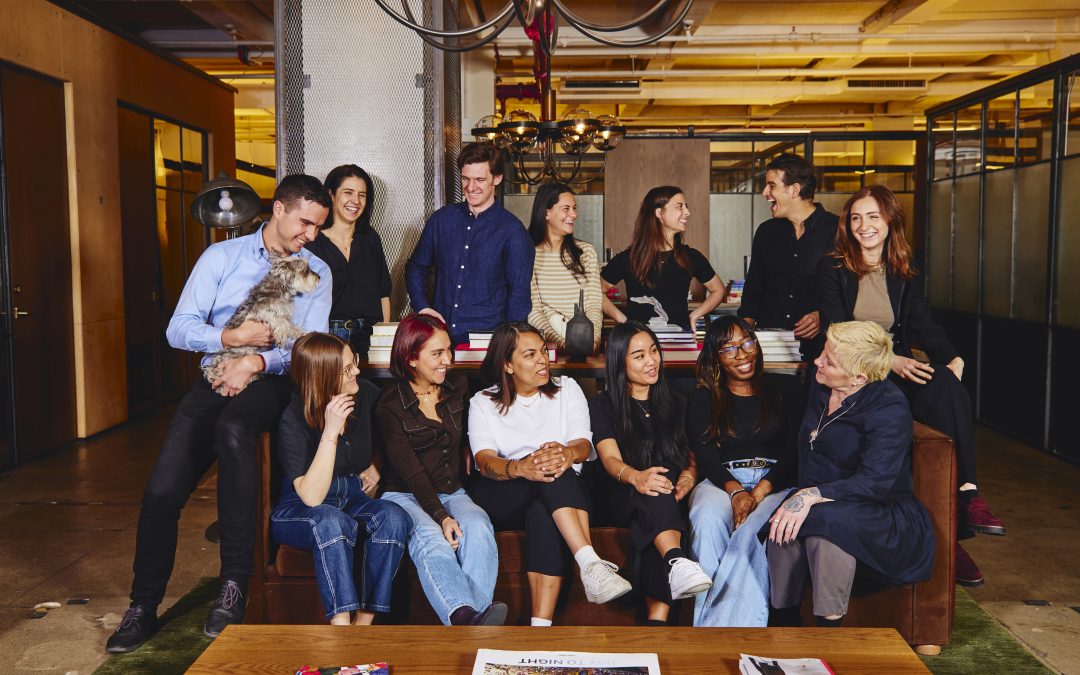Delivery’s rise brought with it a boatload of externalities that paint an uncertain, confusing picture about the future of restaurants. Whether we’re talking about the survival of independent restaurants, environmental consequences of car-based deliveries, the rights of drivers or the widening gap between farms and dining room tables, delivery consultant Scott Landers sees it all as an interconnected system.
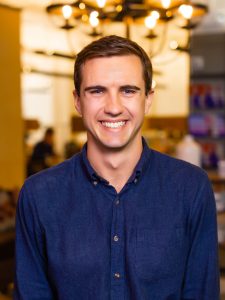
Scott Landers is co-founder and CEO of Figure 8
Growing up as a sixth-generation farmer in Texas, an hour and a half east of Dallas, Landers left the farm for college at Boston’s MIT where his engineering studies built upon a deep appreciation for nature—especially water mechanics and soil.
Classes flowed into internships where he and other students found themselves knee-deep in rivers and ponds cleaning up pollution and studying ways to minimize erosion. In conversation about restaurant delivery, he’s quick to throw out statistics related to how we’ll feed the world in 2050 and how agriculture consumes 70 percent of the water used in the United States.
These are the data points in mind as the co-founder and CEO of Figure 8, a delivery-focused restaurant consultancy in New York, dives into new projects with restaurant operators, tech startups, real estate developers and multinational companies looking to do good things in the world.
Animated by water
Landers will be the first to say that water is the foundation of human life, that we’re all 60 percent water by design and that most of the food we eat is similarly water based. With the calming voice of an NPR host, Landers gets very animated and speaks faster when touching on the topics he truly cares about—and, specifically, about his desire for other people to care, too.
He transitioned his focus from water to food in 2016 during his MIT graduate studies where a professor connected the dots between the environment, family and factory farms and a growing population that is increasingly at odds with the natural environment.
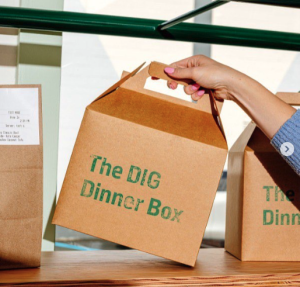
Landers got a job at Dig Inn (now Dig) after moving to New York City.
Not sure where to take his unconventional expertise but confident he wanted to start his own business, Landers moved down the Acela corridor to New York after graduation. He began looking for jobs at places like Blue Apron before finding a home at Dig Inn (now just Dig) that cares about responsible farming in its quest to bring home-cooked food with real ingredients to big-city dwellers.
Its senior leadership rotation program brought him through every department of the growing Dig Inn org chart, just as the company was looking to reinvent its delivery business. Soon, he was taking an engineer’s approach to favorable cuisine types, better packaging and the financial logistics of delivery. As his personal interest collided, he helped launch the brand’s Room Service delivery offering in early 2019.
In retrospect, Bloomberg picking up the Room Service story was a huge boost right when he started realizing that every restaurant in the world was soon going to face their own challenges with delivery.
“It was hard for a big company like Dig Inn to get it right, and I couldn’t imagine what it was like for every other restaurant,” Landers said of the project. “I was seeing the writing on the wall, the delivery numbers going up, all of these third-parties are launching and buying each other out, and it just keeps growing—so I saw an opportunity around food delivery.”
Turning on a dime
With his newfound expertise in food delivery feeling like the start of something big, Landers took a leap by leaving Dig Inn and founding Figure 8 in February of 2019 with just three months of “runway” to pay for food, rent and living expenses.
With some connections in hand, he was technically breaking even just three months later with enough paying clients that he was able to keep going, “live to fight another day,” and to realize that delivery consulting was something worth diving into head first.
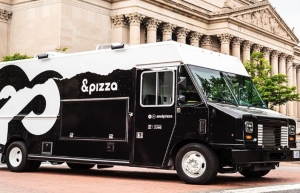
Zuul and &pizza were Figure 8’s first clients.
His first clients were &pizza and Zuul Kitchens, the former a D.C.-based fast-casual pizza chain that was growing quickly and, the latter, one of the earliest upstarts in the ghost kitchen space. Rather than covering the basics of delivery presentation and logistics, Landers was working overtime for two of the most innovative brands in their respective categories, with a primary focus on the economics and software foundation of modern, delivery-first operations.
“There’s this tension of you don’t know enough to be scared and then you start to get a few early wins, and that becomes the wind in your sails,” Landers said of Figure 8’s earliest days.
He soon came into contact with Mexicue, a New York-based Mexican restaurant and Naked Farmer, a Florida-based farm-to-table restaurant serving locally sourced food. Still essentially a one-person shop with a few contractors assisting, he helped both brands build delivery plans just before the pandemic dropped—with March 16 being a week that Landers and many others will always remember.
“We had actually been working with Thomas [Kelly of Mexicue] for six months leading up to that point and we were going to soft launch his delivery business on March 18th,” Landers recalled. “Similarly, we had been working with Jordan [Johnson]; he was planning to open his first Naked Farmer on April 1st. Well, that week I don’t think I slept very much.”
Turning on a dime, Mexicue was able to launch its delivery program within two days of New York restaurants shutting down in-person dining. Mexicue had to let some staff go and move quickly, but “because they had already made this investment in delivery, they were able to seamlessly switch from dine-in to delivery and we were right there in the kitchen making sure that all went according to plan.”
Naked Farmer used an online ordering system Figure 8 helped build, and instantly morphed into becoming a grocery service to deliver farm boxes of raw vegetables and meats to its customer base. That experience, Landers said, is still relevant beyond the pandemic, underscoring the importance of having your own systems “that you control” so you can be flexible and operate “on your own terms.”
Meanwhile, Figure 8’s phone was ringing off the hook as panicked operators and harried journalists (myself included) asked Landers for his take on a suddenly reshaped industry.
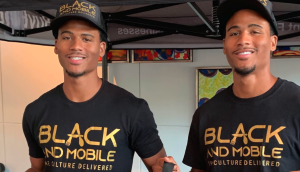
Pepsi’s Dig In program supports black-owned restaurants, including the Black and Mobile delivery platform.
Five months later, during the depths of lockdowns and in the wake of George Floyd’s murder in Minneapolis, Pepsico reached out through an inquiry on Figure 8’s website. Landers initially thought it was spam, but soon realized the multinational food and beverage giant had committed to spending hundreds of millions of dollars to support the black community over the next five years through a range of initiatives, internal and external—and wanted Scott’s help.
“A big part of that was earmarked for restaurants,” he added. Pepsi wanted his help to get black-owned restaurants available and easily found online, while also teaching operators the ins and outs of building a profitable delivery business.
“We put together this really big proposal for them and were fortunate to win that work,” Landers said. “Instead of just writing blank checks for these restaurants and giving out grants, [Pepsi] realized that what they really needed were solutions and skills, and someone to actually come in and build equity into their businesses.”
The Pepsi partnership later expanded to a similar initiative with Hispanic operators, and both programs were just renewed for a fourth year—a massive, ongoing boost to Figure 8’s bottom line.
Keeping sustainability in the foreground
In the intervening years, Figure 8 has widened its focus, consulting on the development of an electrified, purpose-built food delivery vehicle, as well as helping Hudson Yards set up its on-campus delivery system—the largest private real estate development comprising a growing district of skyscrapers on Manhattan’s west side.

Inside Figure 8’s New York City headquarters.
With a growing in-house team that’s up to 14 employees, the consultancy is working with more restaurant clients than ever. As always, Landers can connect what’s happening in the market to larger topics of logistical flowcharts and building systems that are sustainable in both financial and environmental terms.
At the same time, investor shocks across the restaurant tech category, along with supply chain and inflationary pressures have replaced the pandemic as the most urgent outside factors. In this environment, operators tend to look for tweaks to existing systems and ways to make their technology stack work better, rather than paying for “greenfield” investments.
“You have these restaurants that are really just trying to evolve their systems….or they’re wanting to save money on third parties, but how can they do that in a way that doesn’t deflate their rankings,” Landers said. “Financial sustainability as opposed to packaging sustainability are some of the ways we’re positioning ourselves in response to where the herd is going.”
Four years down the stream, delivery and online ordering are still multi-front challenges for the entire foodservice category, but Landers wants to remind the industry that sustainability of all kinds is a shared responsibility.
“We have to recognize that we are a business and not just an education platform that doesn’t have to make money,” Landers said. “If [restaurants] are not around in two or three years, it doesn’t matter, so there’s still this survival hangover mentality, and rightly so.”

